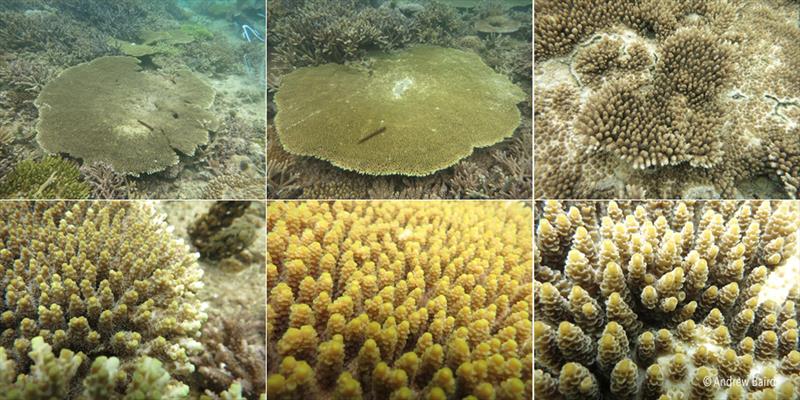
Coral identity crisis
by ARC Centre of Excellence for Coral Reef Studies 30 Nov 2021 06:16 UTC

This image shows Acropora cf cytherea (left) A. aff hyacinthus (right) and A. cf bifurcata (middle). Before this study it was widely speculated that A. cf bifurcata was a hybrid of the other two species. It is instead its own species © Andrew Baird
Researchers have found a new way to distinguish and identify coral species—providing crucial information to help manage coral reefs in a warming world.
Co-author Professor Andrew Baird from the ARC Centre of Excellence for Coral Reef Studies at James Cook University (Coral CoE at JCU) said there's more to identifying coral than meets the eye. He said the new results challenge a widely held assumption that many similar-looking species cross-breed, or hybridise.
"The accurate identification of a species is the single most important aspect of all biology—in particular, for conservation and management," Prof Baird said.
"The difference between coral species depends on a lot more than what they look like. Yet, that is traditionally how they've been classified, without considering how they breed, or their DNA."
He said corals have spectacularly variable shapes and forms, which make them difficult to identify. But it can be done, "if you know your animals and use the correct tools."
Prof Baird said the assumption of shape variations being due to hybridisation emerged because many coral species often spawn together, releasing eggs and sperm en masse. And many colonies are intermediate in shape between one species and another—in the same way that a mule is intermediate in shape between a horse and a donkey, as an actual hybrid species of the two.
The modern tools for species identification include molecular approaches—using DNA markers to reconstruct the genetic ancestry of an individual with others of the same species. However, even these present problems for corals.
"The standard DNA markers that work for distinguishing species in other animal groups are frustratingly unhelpful for delineating coral species or reconstructing their evolutionary history," said Dr Peter Cowman, a co-author of the study from Coral CoE at JCU and Senior Curator of Biosystematics at the Queensland Museum.
In the study, the authors closely examined the table corals of Okinawa, Japan. These table corals are difficult to tell apart, a "taxonomic nightmare", and scientists had previously thought that one of these table species was a hybrid of the other two.
"Using novel genetic techniques, as well as breeding trials, we found they were all separate species that did not breed with each other," said the study's lead author Catalina Ramírez-Portilla, a PhD candidate from Université libre de Bruxelles.
Coauthor Dr Jean-Francois Flot, also from Université libre de Bruxelles, and the Interuniversity Institute of Bioinformatics in Brussels, says to date there are only a handful of confirmed cases of coral hybridisation in the wild.
"Many intermediate forms, which were originally thought to be hybrids, are actually 'good species'." Dr Jean-Francois Flot said.
"This also means that these species instead probably have a much more limited range of where they are found, with much smaller population sizes than previously thought," he said. "Which makes them far more vulnerable to threats, and they should have a far greater conservation status."
Dr Saki Harii from Sesoko Station, Tropical Biosphere Research Center, University of the Ryukyus said, "Shallow corals around Sesoko Island have been studied for decades by researchers from all over the world. Solving species identity issues is crucial to allow for reliable comparisons among these studies."
The authors say the findings have important implications for current plans to rescue reefs from global warming by seeding affected reefs with heat-tolerant individuals from distant locations.
"It is absolutely critical to use and compare data from the correct species before we move them around or attempt to manipulate their genetics," they said.
"More basic biology is the key to effective conservation and management rather than blue sky projects that are unlikely to work and come with substantial risks."